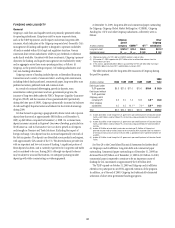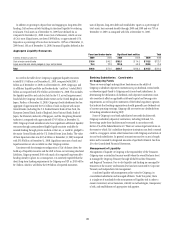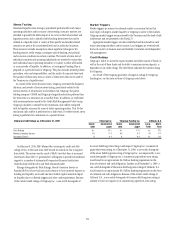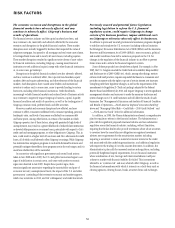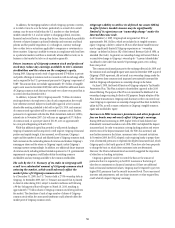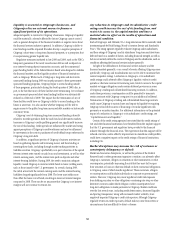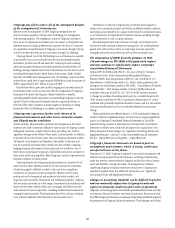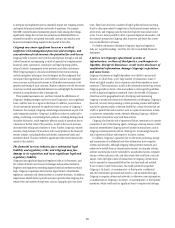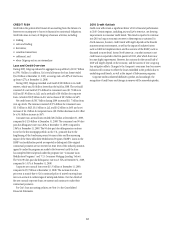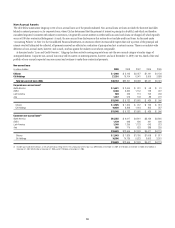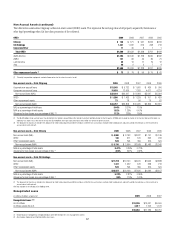Citibank 2009 Annual Report Download - page 68
Download and view the complete annual report
Please find page 68 of the 2009 Citibank annual report below. You can navigate through the pages in the report by either clicking on the pages listed below, or by using the keyword search tool below to find specific information within the annual report.58
Liquidity is essential to Citigroup’s businesses, and
Citigroup relies on external sources to finance a
significant portion of its operations.
Adequate liquidity is essential to Citigroup’s businesses. Citigroup’s liquidity
could be materially, adversely affected by factors Citigroup cannot control,
such as general disruption of the financial markets or negative views about
the financial services industry in general. In addition, Citigroup’s ability to
raise funding could be impaired if lenders develop a negative perception of
Citigroup’s short-term or long-term financial prospects, or a perception that
it is experiencing greater liquidity risk.
Regulatory measures instituted in late 2008 and 2009, such as the FDIC’s
temporary guarantee of the newly issued senior debt as well as deposits in
non-interest-bearing deposit transaction accounts, and the commercial
paper funding facility of the Federal Reserve Board were designed to stabilize
the financial markets and the liquidity position of financial institutions
such as Citigroup. While much of Citigroup’s long-term and short-term
unsecured funding during 2009 was issued pursuant to these government-
sponsored funding programs, Citigroup began to access funding outside
of these programs, particularly during the fourth quarter of 2009, due, in
part, to the fact that many of these facilities were terminating. Citi’s reliance
on government-sponsored short-term funding facilities was substantially
reduced as of the end of 2009. The impact that the termination of any of
these facilities could have on Citigroup’s ability to access funding in the
future is uncertain. It is also unclear whether Citigroup will be able to
regain access to the public long-term unsecured debt markets on historically
customary terms.
Citigroup’s cost of obtaining long-term unsecured funding is directly
related to its credit spreads in both the cash bond and derivatives markets.
Increases in Citigroup’s credit qualifying spreads can significantly increase
the cost of this funding. Credit spreads are influenced by market and rating
agency perceptions of Citigroup’s creditworthiness and may be influenced
by movements in the costs to purchasers of credit default swaps referenced to
Citigroup’s long-term debt.
In addition, a significant portion of Citigroup’s business activities are
based on gathering deposits and borrowing money and then lending or
investing those funds, including through market-making activities in
tradable securities. Citigroup’s profitability is in part a function of the spread
between interest rates earned on such loans and investments, as well as other
interest-earning assets, and the interest rates paid on deposits and other
interest-bearing liabilities. During 2009, the need to maintain adequate
liquidity caused Citigroup to invest available funds in lower-yielding assets,
such as those issued by the U.S. government. As a result, during 2009,
the yields across both the interest-earning assets and the interest-bearing
liabilities dropped significantly from 2008. The lower asset yields more
than offset the lower cost of funds, resulting in lower net interest margins
compared to 2008. There can be no assurance that Citigroup’s net interest
margins will not continue to remain low.
Any reduction in Citigroup’s and its subsidiaries’ credit
ratings could increase the cost of its funding from, and
restrict its access to, the capital markets and have a
material adverse effect on its results of operations and
financial condition.
Each of Citigroup’s and Citibank, N.A.’s long-term/senior debt is currently rated
investment grade by Fitch Ratings, Moody’s Investors Service and Standard &
Poor’s. The rating agencies regularly evaluate Citigroup and its subsidiaries,
and their ratings of Citigroup’s and its subsidiaries’ long-term and short-term
debt are based on a number of factors, including financial strength, as well as
factors not entirely within the control of Citigroup and its subsidiaries, such as
conditions affecting the financial services industry generally.
In light of the difficulties in the financial services industry and the
financial markets generally, or as a result of events affecting Citigroup more
specifically, Citigroup and its subsidiaries may not be able to maintain their
current respective ratings. A reduction in Citigroup’s or its subsidiaries’
credit ratings could adversely affect Citigroup’s liquidity, widen its credit
spreads or otherwise increase its borrowing costs, limit its access to the capital
markets or trigger obligations under certain bilateral provisions in some
of Citigroup’s trading and collateralized financing contracts. In addition,
under these provisions, counterparties could be permitted to terminate
certain contracts with Citigroup or require it to post additional collateral.
Termination of Citigroup’s trading and collateralized financing contracts
could cause Citigroup to sustain losses and impair its liquidity by requiring
Citigroup to find other sources of financing or to make significant cash
payments or securities transfers. For additional information on the potential
impact of a reduction in Citigroup’s or its subsidiaries’ credit ratings, see
“Capital Resources and Liquidity.”
Certain of the credit rating agencies have stated that the credit ratings of
Citi and other financial institutions have benefited from the implicit support
that the U.S. government and regulators have provided to the financial
industry through the financial crisis. The expectation that this support will be
reduced over time, unless offset by improvement in standalone credit profiles,
could have a negative impact on the credit ratings of financial institutions,
including Citi.
Market disruptions may increase the risk of customer or
counterparty delinquency or default.
Market and economic disruptions, as well as the policies of the Federal
Reserve Board or other government agencies or entities, can adversely affect
Citigroup’s customers, obligors on securities or other instruments or other
counterparties, potentially increasing the risk that they may fail to repay
their securities or loans or otherwise default on their contractual obligations
to Citigroup, some of which maybe significant. These customers, obligors
or counterparties could include individuals or corporate or governmental
entities. Moreover, Citigroup may incur significant credit risk exposure
from holding securities or other obligations or entering into swap or other
derivative contracts under which obligors or other counterparties have
long-term obligations to make payments to Citigroup. Market conditions
over the last several years, including credit deterioration, decreased liquidity
and pricing transparency along with increased market volatility, have
negatively impacted Citigroup‘s credit risk exposure. Although Citigroup
regularly reviews its credit exposures, default risk may arise from events or
circumstances that are difficult to detect or foresee.


